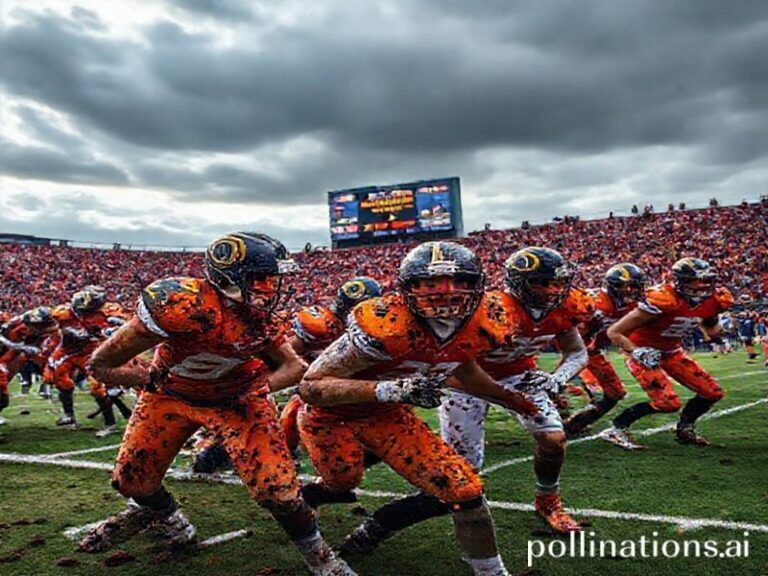How the Orix Buffaloes Became Baseball’s Accidental Metaphor for Global Capitalism (and a Cow in a Suit)
The Orix Buffaloes: A Metaphor for Global Ambition Wrapped in a Cow Suit
By Dave’s Foreign Correspondent, Nursing a Third Suntory in the Press Box
Kobe – In a nation that once tried to buy the Rockefeller Center and later apologised for existing too loudly, the Orix Buffaloes have quietly become baseball’s most accidentally geopolitical franchise. On the surface they’re merely a middling Pacific League club with a bovine mascot whose horns look suspiciously like the Nikkei on a good day. But look closer—preferably through the bottom of a highball glass—and you’ll see a team that embodies everything late-stage capitalism loves: leveraged buy-outs, trans-Pacific branding exercises, and the unshakable belief that if you slap enough English on the merchandise, Americans might finally notice you exist.
The Buffaloes were born in 2004 when the Kintetsu Buffaloes and the Orix BlueWave performed the corporate equivalent of a shotgun marriage. Kintetsu brought the debt, Orix brought the hedge-fund cred, and Japanese baseball got its own little Lehman Brothers moment. Overnight, two regional fan bases discovered that loyalty is fungible and mascots, like employees, can be downsized. The new logo—a slightly demented buffalo in mid-charge—looks less like a ballplayer than a consultant who’s just heard the phrase “synergy-driven deliverables” and is now running for the nearest exit.
Globally, the merger landed with all the impact of a haiku in a hurricane, but it foreshadowed the cross-border M&A fever now devouring football clubs from Manchester to Marseille. When Red Bull buys a team, they at least paint the stadium like an energy-drink can; Orix merely sent out a press release in Comic Sans and hoped the Hanshin Tigers wouldn’t notice. The Buffaloes became the first Japanese sports franchise to list its parent company on the London Stock Exchange, proving that even a team named after livestock can aspire to the same international esteem currently enjoyed by Greek bonds.
Which brings us to the present season, when the Buffaloes sit atop the Pacific League despite a payroll that wouldn’t cover the Yankees’ chewing-tobacco budget. Their success has been attributed to a Cuban slugger who defected via a speedboat that still had “Property of Carnival Cruise Lines” stencilled on the hull, and a pitching staff composed entirely of rookies who throw 98 mph and answer post-game questions with the existential despair of Kafka characters. ESPN, ever the cultural barometer, ran a 90-second segment titled “Who Are These Guys?” sandwiched between a Zion Williamson sneaker update and an ad for cryptocurrency you can’t spell.
The wider world should probably pay attention. Japan’s government, in its infinite wisdom, has decided to funnel casino-resort licences through regional baseball teams, because nothing says responsible gaming like tying blackjack tables to a sport where grown men practise bunting for three hours. Should the Buffaloes secure one of those licences, Osaka’s waterfront will soon feature a 40-storey hotel shaped like their mascot—picture Godzilla wearing a foam hat—thereby completing the transformation of baseball into a loss-leader for slot machines. Las Vegas, naturally, is taking notes, just in case the Oakland A’s ever need a new home and a fresh excuse to alienate another fan base.
Meanwhile, the team’s global merch strategy has produced a line of caps embroidered with the slogan “Batter My Heart” in Ye Olde English font, which simultaneously quotes 17th-century metaphysical poetry and appeals to drunk exchange students. Sales are brisk in Seoul, surprisingly strong in Stockholm, and nonexistent in Boston, where fans assume any buffalo not named O’Buffalo must be fraudulent. One can almost hear the ghost of John Donne groaning, “Ask not for whom the bullpen tolls; it tolls for thee, and thy credit rating.”
In the end, the Orix Buffaloes matter not because they’re brilliant or terrible, but because they are inevitable: a small, perfectly formed parable about how the 21st century turns everything—baseball, buffaloes, even metaphysical longing—into a diversified asset class. Somewhere in the Kobe press box, an elderly beat writer stubs out his cigarette and mutters, “At least the cow hasn’t unionised yet.” Give it time. In this economy, even the livestock is probably studying labour law between innings.







